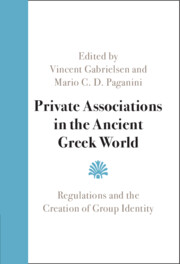Book contents
- Private Associations in the Ancient Greek World
- Private Associations in the Ancient Greek World
- Copyright page
- Contents
- Tables
- Contributors
- Preface
- Abbreviations
- Chapter 1 Associations’ Regulations from the Ancient Greek World and Beyond
- Chapter 2 Admission Procedures and Financial Contributions in Private Associations
- Chapter 3 Regulations on Absence and Obligatory Participation in Ancient Associations
- Chapter 4 The Place of Purity
- Chapter 5 Associations and Place
- Chapter 6 Greek thorybos, Roman eustatheia
- Chapter 7 Private Affairs in a Public Domain
- Chapter 8 A World Full of Associations
- Chapter 9 Ordo corporatorum
- Chapter 10 Rules and Regulations of Associations
- Chapter 11 Conclusion
- Bibliography
- Subject Index
- Index Locorum
Chapter 7 - Private Affairs in a Public Domain
Regulating Behavioural Code towards Benefactresses and Planning a Strategy of Social Impact in Mantinean Associations
- Private Associations in the Ancient Greek World
- Private Associations in the Ancient Greek World
- Copyright page
- Contents
- Tables
- Contributors
- Preface
- Abbreviations
- Chapter 1 Associations’ Regulations from the Ancient Greek World and Beyond
- Chapter 2 Admission Procedures and Financial Contributions in Private Associations
- Chapter 3 Regulations on Absence and Obligatory Participation in Ancient Associations
- Chapter 4 The Place of Purity
- Chapter 5 Associations and Place
- Chapter 6 Greek thorybos, Roman eustatheia
- Chapter 7 Private Affairs in a Public Domain
- Chapter 8 A World Full of Associations
- Chapter 9 Ordo corporatorum
- Chapter 10 Rules and Regulations of Associations
- Chapter 11 Conclusion
- Bibliography
- Subject Index
- Index Locorum
Summary
Despite the considerable number of private associations attested in the Peloponnese, epigraphic sources from this region only rarely allow us an insight into norms of the associations’ internal organisation. Beyond a regulation for the use of an hestiatorion, ‘banquet-hall’, and a chalkion (in this context the term probably refers to ‘bronze cooking utensils’ or the place where they were stored) on a metal tablet from Sicyon (sixth/fifth century BC), which is followed by a list of seventy-three male names,1 and an extremely fragmentary inscription from Mantinea,2 which refers to a nomos and to imposition of fines, texts of this type are not preserved. Some indirect light on private associations’ rules and regulations is further shed by a small number of honorific decrees originating in Peloponnesian towns. This chapter will focus on this category of texts from Mantinea.
- Type
- Chapter
- Information
- Private Associations in the Ancient Greek World , pp. 163 - 178Publisher: Cambridge University PressPrint publication year: 2021

